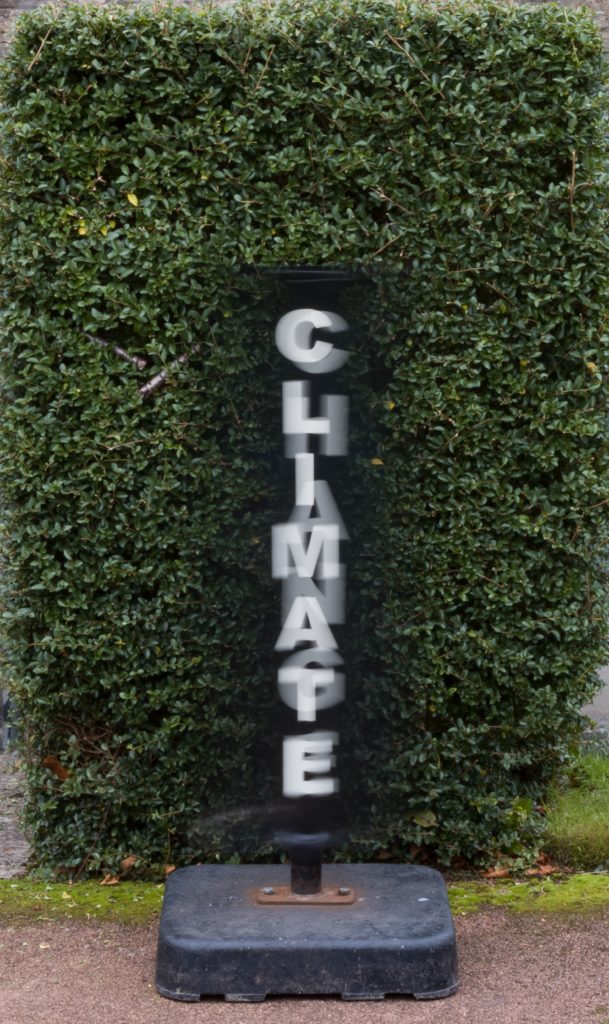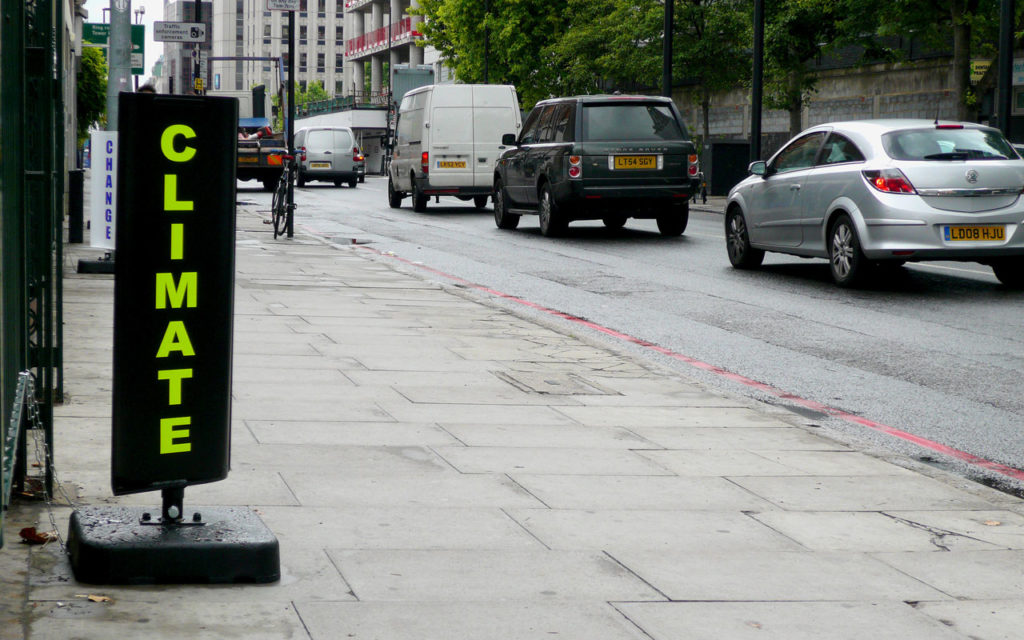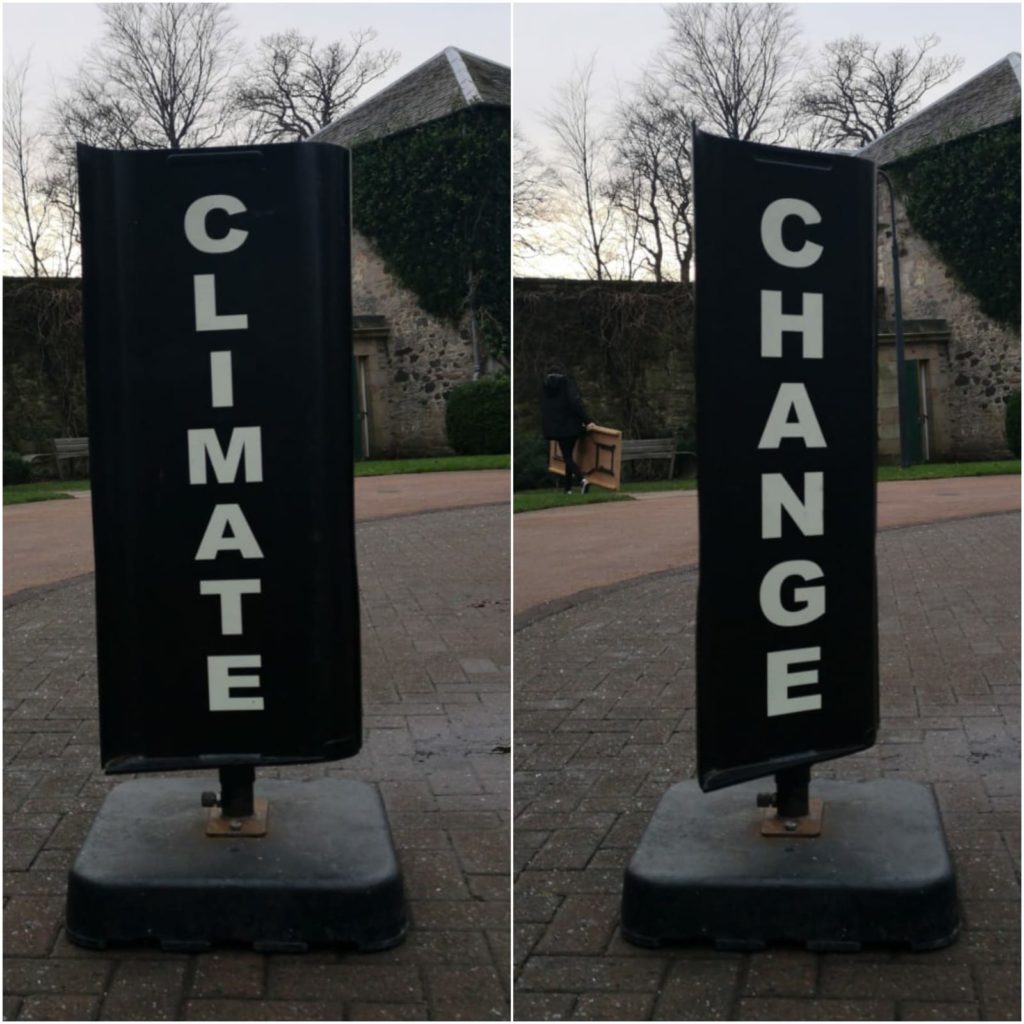
In a time of such unpredictable global conditions, we can’t pull ourselves away from thinking about the timely delivery of RBGE’s adopted artwork Early Warning Signs. Taking up a prominent position at the entrance to Inverleith House at the beginning of 2020, it seems only too fitting that the spinning ‘climate/change’ (‘change/climate’) sign arrived during a particularly stormy January.
The sign in the Gardens is one of four signs produced by British artist Ellie Harrison in 2011 as part of a residency at Two Degrees festival – a biennial festival of art and climate change. During her residency, Harrison tasked herself with ‘researching and exploring our understanding of the relationship between climate change and capitalism.’ However, as she discovered: ‘It seems that the possibility of finding a happy union between the ‘sustainability’ required to avert climate catastrophe and the ‘economic growth’ demanded by capital is by far the greatest conundrum of the twenty-first century.’ Producing these works under the project banner A Good Climate for Business, set by Artsadmin, they were first positioned for public consumption at their base on Commercial Street, London for the duration of the week-long Two Degrees festival.

Photograph courtesy of Ellie Harrison
In Early Warning Signs, Harrison has taken a little regarded but very recognisable form – The spinning signs we are so used to seeing outside establishments advertising: their bureau du change; their odds on a particular game; or the humble MOT. Here, though, they act to ‘promote’ climate change. In Harrison’s own words, they were to: ‘act as beacons for Two Degrees – utilising the brazen marketing techniques of capitalism, not as a tool to sell us more, but as a tool to simply remind us of the consequences of our consumption.’
During her residency, Harrison explored a dilemma that many artists working with this subject face – is it hypocritical to create work exploring Climate Change and environmental themes whilst making material-heavy, permanent objects just to be on display for a short period? As, in February 2010, Harrison had claimed to be the ‘first individual artist to openly publicise an Environmental Policy’ on her website, there was an extra onus on her to interrogate and attempt to resolve this quandary. Within the Environmental Policy on her website, she declared a goal to ‘Reduce, Reuse, Recycle’. Her solution to this predicament was to continue the existence and purpose of the four signs, offering them up for adoption on a yearly basis by art organisations such as Central Saint Martins; ATLAS Arts; Gallery of Modern Art (GoMA), Glasgow and ourselves here at RBGE.

We hosted sign 1/4 (yellow on black) for the entirety of 2020, and have extended our adoption of this work into 2021. The other 3 are currently stationed in various creative corners of the UK (PEER and Hoxton Trust in London, Fermynwoods Contemporary Art in Kettering, and Impact Arts’ Glasgow hub). When the sign arrived at the garden, it felt particularly poignant to be hosting this sign during a time when there were numerous pivotal events planned globally around the theme of the current climate emergency, for example, the now postponed November 2020 UN Climate Change Conference that was due to place in Scotland. Although many of these events are now pushed back, or taking place in the virtual realm, the climate crisis is still ongoing, and being engaged with by many in new, creative ways. For example, during #EarthHour2020 , there were various online streaming channels to learn from, or opportunities to take part in virtual workshops on how to reconsider ways of living more sustainably. For some, the current global pandemic has only served to underline the urgent importance of tackling the climate crisis, such as Jonathon Watts, who wrote for The Guardian: ‘We need to accept – and share – risk. Instead of deferring risks to future generations, weaker populations and natural systems, governments need to transform risks into responsibilities we all bear. The longer we hesitate, the fewer resources we will have at our disposal, and the more risk we will have to divide.’
As a botanical garden whose mission is exploring, conserving and explaining the world of plants for a better future, we must continue to work with those who are engaging with the climate crisis, such as Harrison, in order to protect and guarantee the future of our earth’s rich biodiversity and the planet itself. Within this, art and culture offer a space to articulate, form and develop opinions on vital topics such as the climate crisis in innovative and imaginative ways. Particularly in RBGE’s case – hosting, developing and producing exhibitions within our spaces, all within the context of a world-renowned botanical garden – we are able to bring together diverse audiences in creative ways, forming and developing a new collective knowledge. As culturedeclares.org puts it:
‘Culture, literally, ‘tills’ (cultivates) the soil of a society, creating conditions for renewal and change, ready to plant something anew: systemic changes in land use, energy, finance, food and community resilience, reimagining the world the way we would like it to be.’
We hope that Early Warning Signs’ placement outside Inverleith House, and within the Garden continues to ‘promote’ and initiate urgent conversations around climate/change and drive thoughts towards how we may, collectively and individually, have a positive effect and change/climate.
Following the award of the Outset Transformative Grant, in May 2020, Inverleith House is transforming into Climate House as part of a five- year project, in partnership with the Serpentine Galleries. Climate House will welcome artists from Scotland and around the world to showcase work that encourages conversations about life on earth and expand our understanding of biodiversity and our place in the world.
Climate House projects are curated by RBGE Head of Creative Programmes Emma Nicolson and are guided by the organisation’s new manifesto for the arts By Leaves We Survive (pdf).
To hear more about the vision for Climate House, and how botanical knowledge supports practices of ecological and personal healing, you can listen to Emma in conversation with hosts Victoria Sin and Lucia Pietroiusti, artists Keg de Souza and Nabihah Iqbal, and botanist Greg Kenicer in the Serpentine Podcast Back to Earth: By Leaves We Listen.
